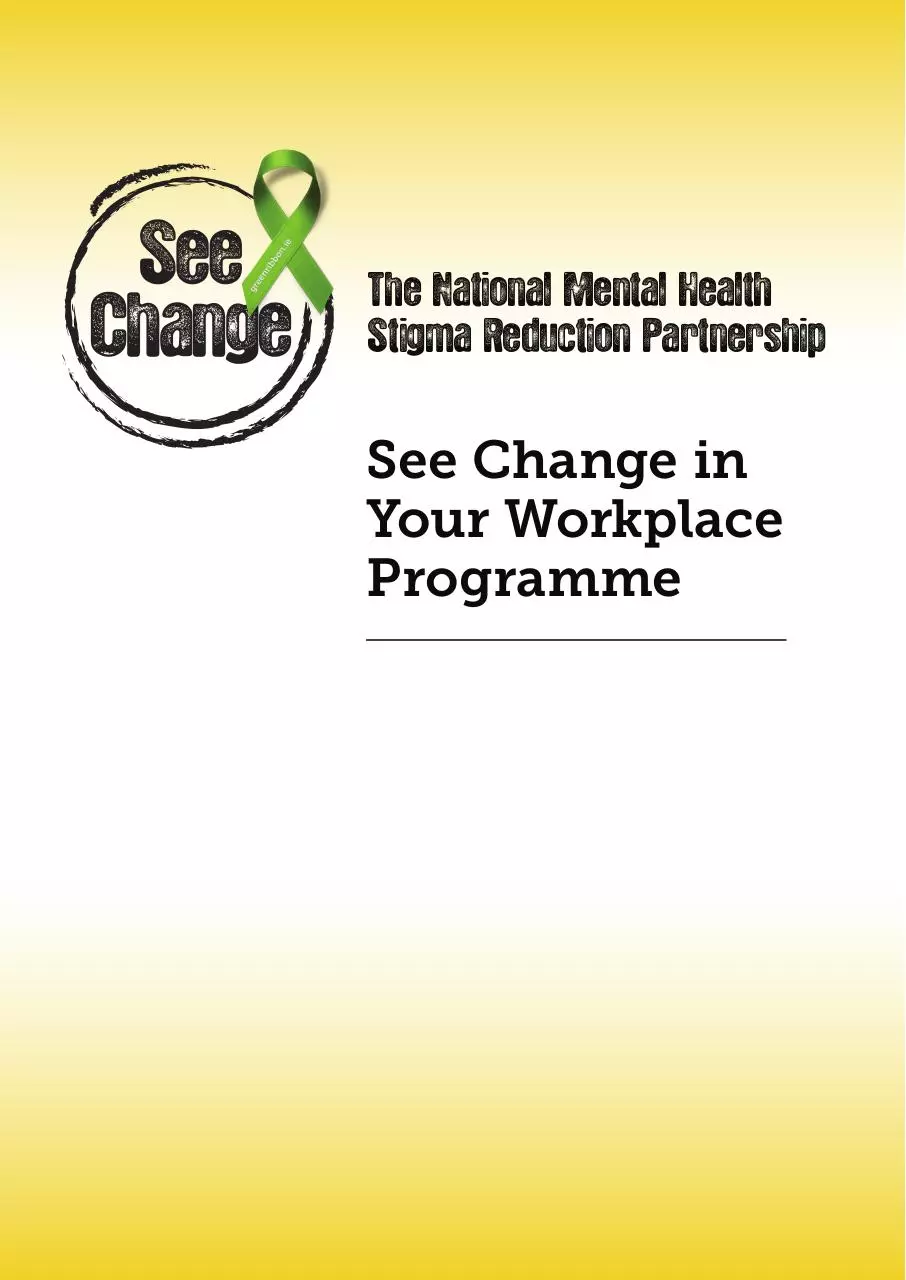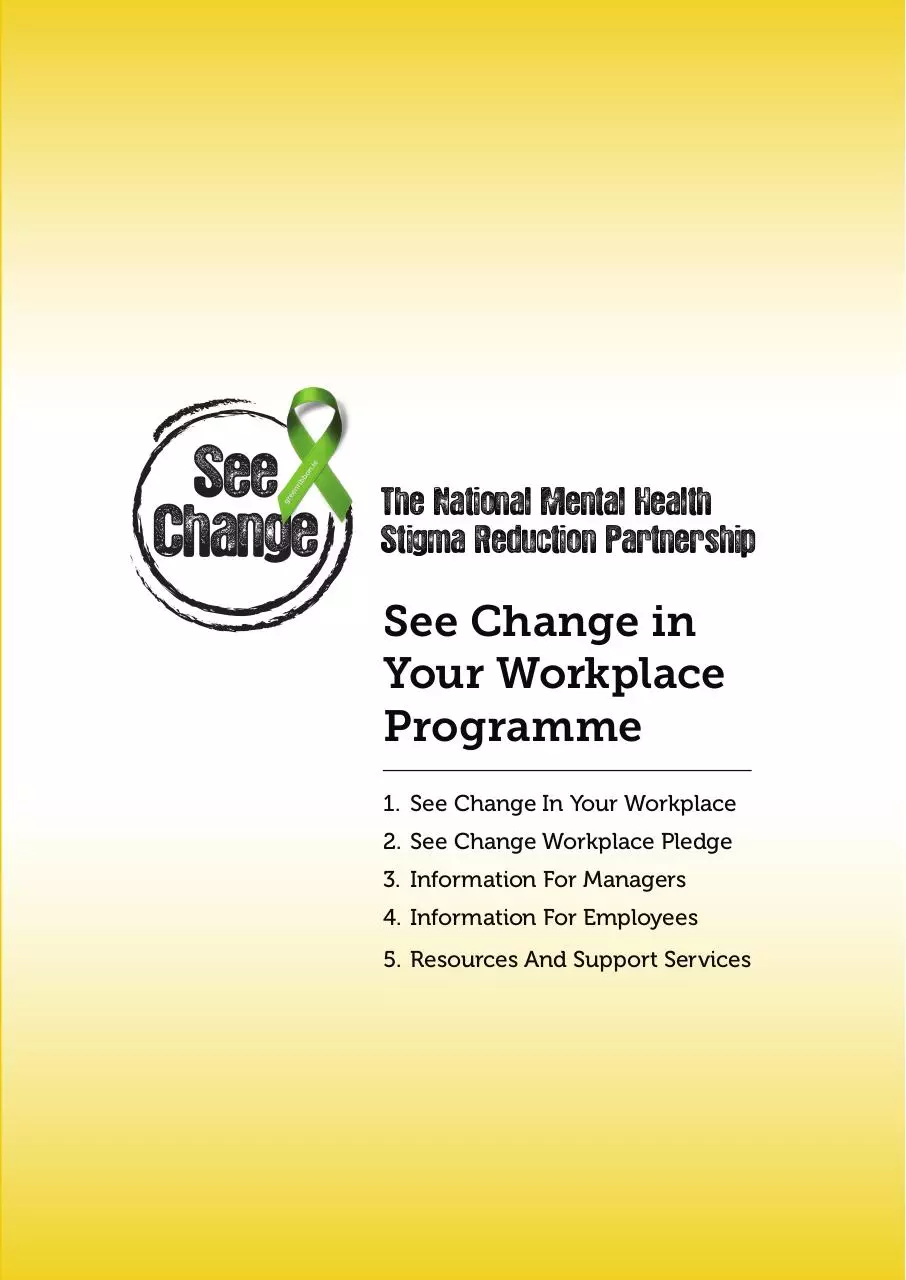See Change Briefing Doc (1) (PDF)
File information
This PDF 1.4 document has been generated by Adobe InDesign CC 2014 (Macintosh) / Adobe PDF Library 11.0, and has been sent on pdf-archive.com on 13/04/2016 at 20:45, from IP address 89.100.x.x.
The current document download page has been viewed 569 times.
File size: 749.01 KB (16 pages).
Privacy: public file





File preview
The National Mental Health
Stigma Reduction Partnership
See Change in
Your Workplace
Programme
The National Mental Health
Stigma Reduction Partnership
See Change in
Your Workplace
Programme
1. See Change In Your Workplace
2. See Change Workplace Pledge
3. Information For Managers
4. Information For Employees
5. Resources And Support Services
See Change in your Workplace Programme
1. See Change in your Workplace
See Change has identified the workplace as a key setting for social change around attitudes
to mental health problems to take place. Our goal is to help facilitate a cultural shift in
workplaces so that employers and employees feel supported and secure in starting a
discussion about how mental health can affect each one of us.
See Change has developed a six step pledge programme to help Irish workplaces create an
open culture around mental health and play a role in challenging mental health stigma. By
signing up to the See Change workplace pledge, organisations are showing that they are
committed to creating an open culture around mental health for managers and employees.
Once organisations have committed to completing the six step pledge programme, See
Change can offer our “Mental health in the workplace” workshops to line managers. The
half-day (3-hour session) workshop provides information on mental health and mental
health problems for employers, managers and employees as well as offering best practise
advice on creating workplaces that are free of stigma and discrimination and equipped to
support the mental health needs of the organisation.
For more information on our six step pledge and workshops for line managers please
contact Dolores@seechange.ie or call 01 8601620.
01
Mental health and employment are undeniably important and intertwined aspects of a
person’s daily life yet See Change research has found that almost half of Irish people would
deliberately conceal a mental health problem from co-workers.
According to Millward Brown & See Change research report “Irish Attitudes and Behaviours
to Mental Health 2012”:
• 57% believe that being open about a mental health problem at work would have a
negative impact on job & career prospects (up from 48% in 2010)
• 47% believe that being open about a mental health problem at work would have a
negative effect on a person’s relationship with colleagues (up from 36% in 2010)
Please see video link below showing how mental health problems touch us all: https://
www.youtube.com/watch?v=eUA8oOd8cmg
Without open discussion of mental health problems, valuable time is wasted hiding
something that can often be easily supported within an organisation.
See Change in your Workplace Programme
The Business Case For Creating A Workplace That Is Open
To Discussing Mental Health
It makes good business sense to support employees who are struggling with mental health
problems. In 2008 the Mental Health Commission report The Economics of Mental Health
Care in Ireland estimated the direct annual cost of poor mental health in Ireland at €3
billion. These costs include:
• Loss of potential labour supply
• Unemployment
• Absenteeism
• Presenteeism
• Reduced productivity in the workplace
• Poor performance
• Reduced morale
• Low motivation
• Reduced productivity
• Reduced efficiency
• Faulty decision making
• Poor industrial relations
• High staff turnover
• Early retirement
• Management time to deal with issues
• Providing temporary cover
• Complaints and litigation associated with problems
• Costs to government of health care and rehab
According to the CIPD (Chartered Institute of Personnel and Development) stress, anxiety
and depression are the leading causes of long term absence for non-manual workers and
the current economic climate has exacerbated stress levels in the workplace.
Creating workplace environments where people can be open and positive about their own
and others’ mental health:
• promotes overall organisational and individual wellbeing
• reduces absenteeism
• enhances employee stress management skills
• reduces cost associated with absenteeism, employee relations issues, talent retention
and acquisition
• can assist employers in developing systems to support the 1 in 4 employees who may
experience mental health difficulties at a given point.
02
See Change in your Workplace Programme
2. See Change Workplace Pledge
By pledging to become a See Change workplace your organisation is making a
commitment to completing the six steps of the See Change workplace programme.
Prior to signing the See Change workplace pledge, organisations must create an action
plan detailing how the organisation plans to achieve the six steps of the programme. This
plan is a statement of the organisation’s intent to work towards creating an open culture
around mental health in the workplace and to reduce the stigma and discrimination
associated with mental health problems.
Our 6-step workplace programme consists of the following:
Managerial Level (Address the needs of the organisation at
managerial level)
1. Training workshops: Receive “See Change Mental Health in the Workplace” training
for line managers. These workshops are fully funded by the National Office for Suicide
Prevention so there is no cost for the organisation. Please note that the number of
workshops is limited depending on availability and the size of the organisation.
03
2. Policy overhaul and implementation: See Change has developed a template “Mental
Health Policy Document” which will be shared with you to help your organisation
develop a Mental Health Policy.
Staff-Wide (Embed an open culture towards mental health
across your organisation)
3. Mental health awareness/ wellness training: Host mental health awareness training
and wellness workshops for staff. Create internal communications campaigns
promoting wellbeing in your newsletters, on noticeboards, in the staff canteen or on
your organisation’s intranet site.
4. In-house mental health promotion: Nominate staff champions to promote
wellness and challenge stigma and provide information for staff to access with ease.
Organisations should nominate a representative to attend the quarterly support
network forums where you can engage with other organisations that have taken the
pledge, share ideas and listen to guest speakers on mental health topics.
See Change in your Workplace Programme
Public Engagement (Make it official that you are a See
Change workplace)
5. Engage your stakeholders: Organise a stigma challenging activity in your workplace in
partnership with See Change and involve local communities and stakeholders.
6. Become an official See Change workplace by signing the workplace pledge: This is
a public statement that your organisation is aiming to tackle mental health stigma and
discrimination in the workplace and has completed or is in the process of completing
the first five steps in the workplace programme aimed at creating an open culture
around mental health at work for staff.
If you are interested in taking the See Change Workplace Pledge please contact Dolores
Kavanagh on 01 8601620 or e-mail dolores@seechange.ie
04
See Change in your Workplace Programme
3. Information For Managers
What A Manager Can Do To Support Someone Who May Be
Experiencing A Mental Health Problem:
• Take time to talk to the person privately: Ask them if something is wrong but take your
steer from them
• Be honest in assessing the employee’s recent performance
• Don’t make assumptions on what someone can and can’t do.
• Ask the person what would help them at work: Find out what reasonable
accommodation means and what the law says.
• Treat them with respect (in the language you use and the attention you give to them)
and act as a model to encourage other colleagues to do the same.
• Be aware that changes, restructuring or the risk of redundancy can be particularly
difficult.
• Suggest that the individual asks for advice from their occupational health advisor
or contact any support services the organisation uses e.g. the company’s Employee
Assistance Programme
• Keep the dialogue going (even is a person is on sick leave)
05
See Change Workshops For Line Managers
Once organisations have committed to completing the six step pledge programme, See
Change can offer our “Mental health in the workplace” workshops to line managers. The
half-day (3-hour session) workshop provides information on mental health and mental
health problems for employers, managers and employees as well as offering best practise
advice on creating workplaces that are free of stigma and discrimination and equipped to
support the mental health needs of the organisation.
These workshops are delivered by two fully trained workshop facilitators, one of whom
will speak about their personal experience of having a mental health problem and their
recovery journey.
The workshops are funded by the National Office for Suicide Prevention and covers the
cost of the trainers and their expenses thus enabling See Change to provide this excellent
training package free of charge to organisations.
See Change in your Workplace Programme
Topics Covered During The Workshop:
• Introduction to mental health, mental health problems and how they relate to the
workplace context followed by an opportunity to discuss the myths that surround
mental health problems and Irish attitudes to mental health.
• Attendees will benefit from the expertise and personal insight of a workshop facilitator
who will share the story of their own mental health journey, from being the subject of
stigma in the workplace and the wider community to now creating strategies to support
mental health needs.
• Advice on how best to support an employee who is experiencing a difficulty with their
mental health through information on relevant equality legislation, resources available,
examples of reasonable accommodation, recommendations on responding to a crisis
and simply starting a conversation about mental health in the workplace.
Discussion on creating a culture that is open to and supportive of the mental health needs
of an organisation.
Start Your Conversation
You don’t have to be an expert to start talking about mental health or have all the answers.
Sometimes the most helpful thing you can do is to let a colleague or employee know that
you are there for them and simply listen.
• Talk, but listen too: Simply being there will mean a lot.
• Take your lead from the person: As a first step, ask how best you can help.
• Don’t just talk about mental health: Chat about everyday things as well.
• Remind them you care: Small things can make a big difference.
• One to ones: Go for coffee and ask someone how they are doing or even send an
email.
• Look out for changes: if someone is not quite themselves
• Be informed: Check out our Workplace Resources page for details of where you can
find further information and supports available.
• Avoid the clichés: Phrases like ‘Cheer up’, ‘I’m sure it will pass’ and ‘Pull yourself
together’ definitely won’t help – Being open minded, non-judgemental and
listening will.
06
Download See Change Briefing Doc (1)
See Change Briefing Doc (1).pdf (PDF, 749.01 KB)
Download PDF
Share this file on social networks
Link to this page
Permanent link
Use the permanent link to the download page to share your document on Facebook, Twitter, LinkedIn, or directly with a contact by e-Mail, Messenger, Whatsapp, Line..
Short link
Use the short link to share your document on Twitter or by text message (SMS)
HTML Code
Copy the following HTML code to share your document on a Website or Blog
QR Code to this page

This file has been shared publicly by a user of PDF Archive.
Document ID: 0000360077.